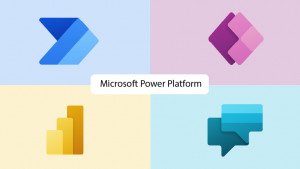- September 21, 2021
- UpperEdge
- Reading Time: 3 minutes

Microsoft had an impressive Q4’21 bringing in revenues of $46.2B. As part of the earnings presentation, it was clear that they would be making an aggressive push for enterprise customers to adopt their all-in cloud bundle Microsoft 365 AND the products that make up their Power Platform (Power Apps, Power Automate, Power BI, and Power Virtual Agents).
As enterprise customers approach their upcoming renewals or as Microsoft pushes for adoption or ramped use of Power Platform products pre-renewal, it is critical to understand the importance of the Power Platform solutions to Microsoft and how best to leverage them should they, in fact, fit into your overall Microsoft roadmap.
What is Microsoft’s Power Platform?
The Microsoft Power Platform is a line of business intelligence, app development, and app connectivity software applications. These applications allow you to automate processes, build solutions, analyze data, and create virtual agents. The core products include PowerApps, Power Automate, Power BI, and Power Virtual Agents, combining these core solutions into one powerful business application platform for quick and easy app building and data insights. According to Microsoft, “The Power Platform is more than the sum of its parts. Connect them together and to Office 365, Dynamics 365, Azure, hundreds of other apps, and build end-to-end business solutions.”
How is Power Platform Licensed?
For enterprise customers interested in adopting the Power Platform, it is imperative they understand the licensing components of these individual products.
- The Power Apps per app plan is licensed on a per user/app/month basis.
- The Power Automate plan is licensed on a per user/month basis. However, the Power Automate per flow plan enables organizations to implement flows without having to license each end user. This plan is licensed on a per month/flow basis.
- The Power BI Pro and Premium are licensed on a per user/month basis. Power BI Premium is also licensed on a per capacity/month basis and that option is for enterprise customers who may want to license their organization with capacity to accelerate access at an enterprise scale without per user licenses.
How Does Power Platform Compete?
Microsoft continues to experience tremendous growth in pushing customers towards their Power Platform set of solutions, which were created to compete with other major cloud vendors, such as Salesforce and ServiceNow. More specifically, since Salesforce created their CRM software, Microsoft has had little luck in displacing the dominant CRM player until now. Similarly, Microsoft’s Power Platform competes with the ServiceNow Now Platform.
How Microsoft is Getting Organizations to Adopt
Microsoft is promoting the integration components, selling enterprise customers as much as they possibly can, and tethering Power Platform to other Microsoft solutions. The analyst community was told that the number of organizations using Power Apps has more than doubled year-over-year and that Power Platform revenue has increased 83% over the past year.
An example of Microsoft ramping up customer adoption by tethering it to other Microsoft solutions is evident in CFO Amy Hood’s exclamation that Dynamics 365 revenue growth was 49%, largely attributed to the strong momentum in Power Apps and Power Automate. She expects continued strength in Dynamics 365 which includes driving revenue growth in the high 20 percentage range.
In Microsoft’s efforts to tether their industry solutions together, they also started pushing custom SKUs into customer portfolios such as the LinkedIn and Dynamics SKU. Microsoft continues to experience tremendous success from a revenue perspective from the products themselves, their integration components, and their promotion as one set of solutions where customers will receive the value through integration.
Power Apps Price Reduction
Enterprise customers interested in adopting Power Apps should be aware that in July, Microsoft announced that they are cutting the price of Power Apps in half starting on October 1st, 2021. Power Apps (per user) currently sells for $40.00 per user/month but will be reduced to $20.00 in October. Similarly, Power Apps (per app) currently sells for $10.00 per user/app/month but will be reduced to $5.00 in October. However, enterprise customers should also be aware that the features have been reduced as well.
Customers with licenses purchased before October will retain the current entitlements until renewal. For organizations looking to purchase Power Apps before October, Microsoft has extended two promotions:
- Power Apps per user will sell for $12.00 per user/month with a minimum of 5,000 licenses.
- Power Apps per app will sell for $3.00 per user/app with a minimum purchase of 200 licenses.
What Customers Need to Know
As enterprise customers begin to approach their upcoming renewals, understand how important the Power Platform set of solutions are for Microsoft, especially since they have already provided a lens into how they plan to continue to reach their targeted goals. Customers should be aware of the strategies Microsoft employs in getting them to adopt their Power Platform, whether it is by trying to sell customers as much as they possibly can, tethering it to their other solutions, or by promoting the integration components. Armed with this information, it is important for enterprise customers to understand where on the roadmap this falls and how they can use it as leverage to optimize their go-forward relationship with Microsoft.